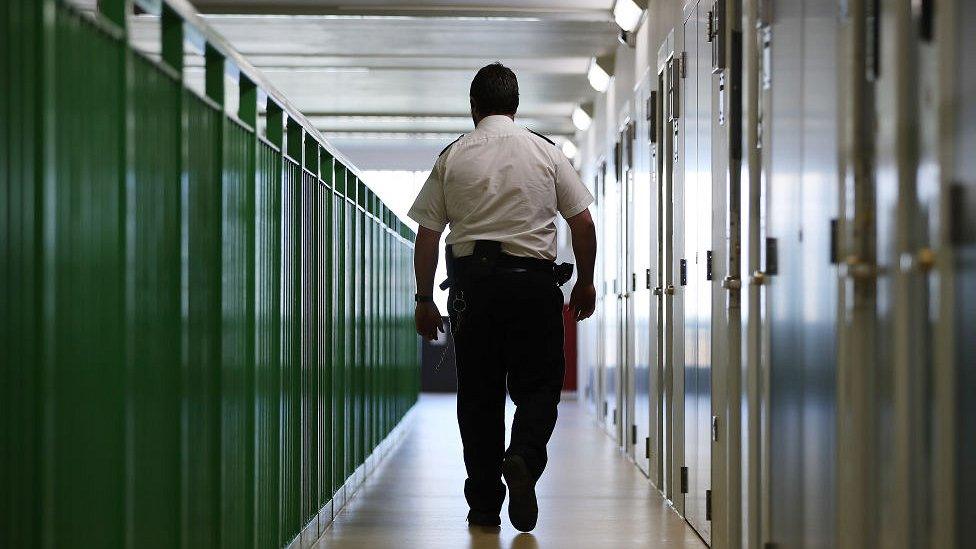Covid: 'Prioritise prisoners for coronavirus vaccine'
- Published

Prisoners have an elevated risk of dying of Covid and should be prioritised for vaccination, along with prison staff, say researchers from University College London (UCL).
The risk is driven both by greater exposure to the virus, and by having generally poorer health to start with.
And Covid has meant many prisoners have been living in near-total isolation.
The Joint Committee on Vaccination and Immunisation said its current priority list would prevent 99% of Covid deaths.
"As the single greatest risk of death from Covid-19 is older age, prioritisation is primarily based on age," Prof Wei Shen Lim, the JCVI's Covid-19 chairman said.
While the JCVI "recognises that there may be an increased risk of transmission in prisons", it was agreed it would be "difficult to advise additional prioritisation of detainees above the wider population based on the potential increased risk of exposure in a detained setting alone," a spokesperson said.
The UCL researchers argued that earlier vaccination would not only protect prisoners' health but would restore their access to education, rehabilitation programmes and family visits.
This may reduce their chances of reoffending, and prevent prison from being a "lost opportunity", said Dr Isobel Braithwaite, who led the study.
But, she said, the high mortality rates were the most significant point: "There has to be an adequate response to that given the government's legal duty of care."
Solitary confinement
During the first wave of the pandemic, there were eight Covid-19 cases per 1,000 people in prisons in England and Wales compared with five cases per 1,000 in the general population.
This may be an underestimate, as research suggests prisoners were not reporting symptoms for fear of being put in solitary confinement, Dr Braithwaite said.
Even without symptoms, prisoners faced being in their cells for 23 hours a day, the team said.
Adult prisoners should normally spend between eight and 10 hours a day outside their cells.
Prison staff were also being exposed to these higher rates in a closed setting, similar to people working in social care who are prioritised for the jab.
The researchers said it was "clear" whole prisons needed to be vaccinated, including their staff.
There were 121 Covid deaths in prisons between March 2020 and February 2021, the paper published in the Lancet Journal of Respiratory Medicine found - 3.3 times more than the death rate among people of a similar age and sex in the wider community.
The Ministry of Justice said the latest figure had been adjusted down to 118 per 1,000 - but for those who died directly from Covid rather than within 28 days of a positive test, it was 93.
A spokesperson said: "The suggested death rate is highly misleading and fails to take into account tens of thousands of additional offenders who move in and out of prisons every year.
"We have protected the lives of thousands of staff and prisoners - deaths are significantly lower than predicted and cases have fallen for seven consecutive weeks, as our strict measures limit the spread of the virus."
Health vulnerabilities
There are about 80,000 people in prison in England and Wales, the vast majority (roughly 70,000) of whom are under the age of 50 and therefore not automatically prioritised for a jab.
The researchers believe the increased risk is mostly driven by prisoners' greater exposure to the virus, although it is difficult to disentangle this from pre-existing health vulnerabilities.
Figures compiled by the Prison Reform Trust suggest 36% of people in prison have a physical or mental disability compared with 18% of the general population.
"Many experience chronic health problems prior to or during imprisonment as a result of poverty, poor diet, inadequate access to healthcare, alcoholism, smoking or other substance abuse," according to the charity.
And they are more likely to have long-term infections including HIV, Hepatitis C and TB.
Some of these factors will make a proportion of prisoners eligible for early vaccination anyway.
But "limited interaction with health services, both during and before prison" means some people could wrongly be considered to be low priority, the report suggests.
Homeless
As of this week, people in England who are homeless or sleeping rough are being prioritised for Covid vaccines, alongside those with underlying conditions that put them at increased risk.
Dr Braithwaite said it followed that people in prison must also be prioritised since they were at "equivalent if not higher risk" - and many had been homeless prior to being imprisoned.
There was also a risk, as cases fall nationally, that outbreaks in institutions like prisons could re-seed infections in the wider community through staff, court visits and released prisoners, she said.